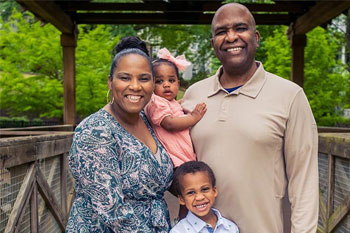 A necessary part of the adoption process at Lifetime Adoption Agency is vetting hopeful adoptive parents. The vetting process is a crucial step to ensure that every child is placed in a safe and loving home.
A necessary part of the adoption process at Lifetime Adoption Agency is vetting hopeful adoptive parents. The vetting process is a crucial step to ensure that every child is placed in a safe and loving home.
But let’s be honest—inspections and interviews can be intimidating. It’s completely normal to worry about whether you’ll measure up. Common concerns we hear are, “Do you have to own a home to adopt?” and “Can you adopt if you rent?”
These questions are important, and we’re here to reassure you that the journey to adoption is about more than just home ownership. It’s about your commitment to providing a nurturing environment for a child. Wondering how you can prepare and what you need to know? Let’s explore the answers together!
Do You Have to Own a House to Adopt?
No; you are eligible to adopt if you rent your home. Many people who dream of expanding their families through adoption may have concerns about their living situation, especially if they rent. However, renting should not deter you from pursuing adoption.
What truly matters is the warmth, stability, and love that you can offer to a child. A home is defined not merely by its ownership but rather by the environment it fosters. Creating a loving, nurturing space is paramount, and this can be achieved in a cozy apartment or a rented house.
Safety is the cornerstone of any home, and as a renter, you can take steps to ensure your environment meets the necessary standards for a child’s well-being. This includes child-proofing your space, ensuring that it’s free of hazards, and making it a welcoming haven filled with joy and support.
As you prepare for adoption, being emotionally and financially ready is necessary. Consider your support network—friends, family, and community—who can provide assistance and encouragement. Create a budget to accommodate the additional needs that come with a child, whether it’s for everyday expenses or unexpected costs.
The Adoption Home Study
Every state requires hopeful adoptive families to participate in an adoption home study. This process includes background checks, evaluation of your medical history and finances, interviews with a social worker, and a home visit. During the home visit, the home study provider will meet with your family in your rental home.
The home study provider is looking to see that your home is safe, tidy, has adequate space for a child, and is generally conducive to a growing family. Homes of all shapes and sizes can fit these criteria, so you don’t need to worry if you don’t live in a mansion.
Home Study Checklist
Apartments, condos, townhouses, and duplexes can all be wonderful homes for raising children. Whether you rent or own your home, you can use this home visit checklist to make sure you are prepared for this portion of your home study:
- Lock closets or cabinets that contain cleaning supplies or other toxic materials.
- Keep choking hazards, such as dangling cords, out of reach.
- Meet fire inspection codes by properly maintaining smoke and carbon monoxide detectors.
- Inspect the yard for any potential hazards.
- Lock away firearms and store them in a location that is out of reach.
- Make sure windows are secure and have screens.
- Ensure that heating and cooling systems work correctly.
- Make sure any lead paint has been removed if you live in an older rental home.
- Create space in your home for your child to sleep and play.
You may need assistance from your landlord or property manager to ensure your home meets the home study requirements since the property owner typically manages its required inspections. Let your landlord or property manager know that you are going through the adoption process. They may even be able to help if the property is missing a requirement, such as fences or railings.
Keep in mind that if you move during the adoption process, you will need to update your home study.
Discuss Your Rental Home in Your Profile
Birth mothers will want to know about your home and your neighborhood so they can envision where their child will grow up. Your adoption profile is a way to showcase what your family has to offer a child, and that includes the loving home you have created. Use this opportunity to highlight the benefits of living in a rental home. Perhaps it allows you to save money, or it gives you more flexibility in your leisure time. Instead of spending your weekends on home improvement projects or yard work, you will be able to enjoy more quality time with your child.
Discuss how your home fits into the larger community. Is your neighborhood diverse? Are there opportunities for education, entertainment, and cultural enrichment nearby? Highlight what your community has to offer a child.
Communicate With Your Adoption Agency
As you navigate the adoption process, remember to communicate openly with your adoption agency about your living situation. They are there to guide you and can provide valuable insights into any specific requirements you might need to address.
Ultimately, your ability to love, guide, and nurture a child transcends the walls of your home. Embrace your journey with confidence, knowing that so many children out there are hoping to find the right family to call their own—home is where the heart is, and love knows no boundaries.
Benefits of Renting Your Home
Renting your home is not a negative strike against you in the adoption process. In fact, renting your home may provide you with some unique opportunities.
Many families save money by renting their homes. Without the financial burden of mortgage payments, you may have more money for family vacations, private education, or extracurricular activities for your child.
Some hopeful adoptive parents with open preferences actually choose to rent until their child has been placed with them. For example, couples who are open to adopting a child with special needs may wait to buy a home with a specific floor plan or a home that is near specialized resources once they know the needs of their child. Renting makes the future home-buying process much easier.
Hopeful adoptive parents who are renting should not hesitate to begin their adoption journey. When it comes to living space, it’s the family that transforms a house into a home. Being a homeowner has no bearing on your ability to be a successful parent.
Editor’s Note: This article was originally published on August 5, 2020, and has since been updated.
Founder of Lifetime Adoption, adoptive mom, adoption expert, and Certified Open Adoption Practitioner (C.O.A.P).
Since 1986, adoption expert Mardie Caldwell has been dedicated to bringing couples and birth parents together in order to fulfill their dreams.
“Many years ago, I was also searching for a child to adopt. We didn’t know where or how to get started. Through research, determination, and a prayer, our dream of a family became reality. I started with a plan, a notebook, assistance from a caring adoption consultant and a lot of hard work; this was my family I was building. We had a few heartaches along the way, but the pain of not having children was worse!
Within weeks we had three different birth mothers choose us. We were overwhelmed and delighted. Many unsettling events would take place before our adoption would be finalized, many months later. Little did I know that God was training and aligning me for the adoption work I now do today. It is my goal to share with our families the methods and plans which succeed and do not succeed. I believe adoption should be affordable and can be a wonderful “pregnancy” for the adoptive couple.
I have also been on both sides of infertility with the loss of seven pregnancies and then conceiving by new technology, giving birth to a healthy daughter. I have experienced first-hand the emotional pain of infertility and believe my experience allows me to serve your needs better.
It is my hope that for you, the prospective parents, your desire for a child will be fulfilled soon.”






0 Comments